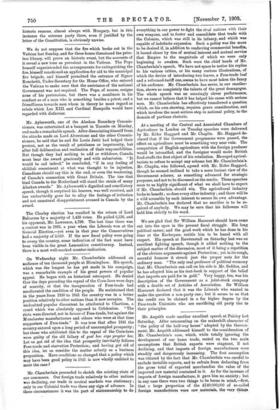On Wednesday night Mr. Chamberlain addressed an audience of ten
thousand people at Birmingham. His speech, which was the longest he has yet made in his campaign, was a remarkable example of his great powers of popular appeal. He began with an historical retrospect. He denied that the days preceding the repeal of the Corn-laws were days of scarcity, or that the inauguration of Free-trade had ameliorated the condition of the people. He maintained that in the years from 1830 to 1841 the country was in a better position relatively to other nations than it now occupies. The undoubted popular discontent he attributed to Chartism, a creed which was absolutely opposed to Cobdenism. "The riots were directed, not in favour of Free-trade, but against the Manchester manufacturers and others who were at that time supporters of Free-trade." It was true that after 1841 the country entered upon a long period of unexampled prosperity; but those who attributed this to the repeal of the Corn-laws were guilty of the old fallacy of post hoc ergo propter hoc. Let us get rid of the idea that prosperity inevitably follows Free-trade and starvation Protection; and having got rid of this idea, let us consider the matter soberly as a business proposition. Have conditions so changed that a policy which may have been good policy in 1841 is now wholly unfitted to meet the case P






























































 Previous page
Previous page